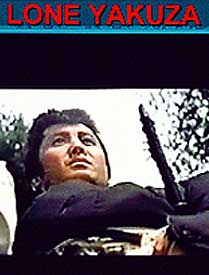 Tai Kato's Kutsukane Tokujiro yukyo ippiki (Toei, 1966) has been variously exhibited as Tokijiro the Gambler aka Lone Yakuza aka One Man of the Gambler's Code aka Bloody Blade. Tai Kato's Kutsukane Tokujiro yukyo ippiki (Toei, 1966) has been variously exhibited as Tokijiro the Gambler aka Lone Yakuza aka One Man of the Gambler's Code aka Bloody Blade.
Tokijiro the Gambler (Kinnosuke Nakamura in his last role for Toei Studios before going independent) has a tendency toward melancholy & his status as a loner has more to do with his feelings of loneliness rather than a lack of companions. A tone of comedy is highlighted in early scenes by comic actor Kiyoshi Atsumi (of the Tora-san series), who functions almost as Tokijiro's Sanzo Panza type sidekick. But humor does not undermine the tragedy & harshness of events.
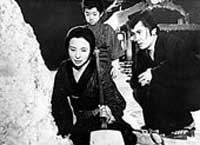 Wandering gamblers were frequently regarded as outcasts not welcome in highway inns, but are welcomed into gambler-boss's residences along the way. This incurs a debt of "a night of obligation" in exchange for "a night's lodging." In many films of this sort becomes the basis for the tragedy that follows, when an unpleasant gangster boss accepts a wanderer into the household then requires him, for his incurred debt, to go kill somebody. Wandering gamblers were frequently regarded as outcasts not welcome in highway inns, but are welcomed into gambler-boss's residences along the way. This incurs a debt of "a night of obligation" in exchange for "a night's lodging." In many films of this sort becomes the basis for the tragedy that follows, when an unpleasant gangster boss accepts a wanderer into the household then requires him, for his incurred debt, to go kill somebody.
After having killed a man, Tokijiro takes on the responsibility of caring for the slain man's sick wife & kid. Tokijiro admits, "Gamblers are worms." Before the tale is over he will have killed all the bad guys to avenge the death of his friend, but is also put in a position of having to kill good people or misguided people.
Director Tai Kato was very nearly a household name in Japan during this period of his career. His films though commercially inclined are not as rigidly studio-bound as for most directors, as he was able to work with some of the best actors & he clearly cared about what he was filming. For Tokijiro the Gambler he adapts a stylized look at many points of the film, with willfully unreal sets & backdrops. The swordfighting scenes are wonderfully choreographed, & Kinnoosuke is looking especially beautiful & strong with his sword.
The woman he has been caring for (Junko Ikeuchi) from his sense of obligation, & with whom he has fallen in love, dies of her illness before he can return from the carnage. The child he has also come to love & who looked up to him becomes disillusioned with Tokijiro's supposed heroism, & rightly so. By the end even Tokijiro is so disgusted with the idea of revenge that he throws his sword away before walking off into the sunset.
Additional supporting cast includes Chiyonosuke Azuma, Keiko Yumi, Yoko Mihara, & Jiro Okazi.
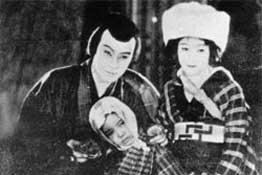 Adapted from a folksy kabuki play & subject of a popular folksong, this "chivalrous commoner" presumedly came from the post town of Kutsukane, today Karuizawa where there is a park with a monument to Tokijiro. Adapted from a folksy kabuki play & subject of a popular folksong, this "chivalrous commoner" presumedly came from the post town of Kutsukane, today Karuizawa where there is a park with a monument to Tokijiro.
The place-name of Kutsukane means "put on your shoes," being an allusion to travel, in this case the perpetual travels of a matatabi or wandering gambler.
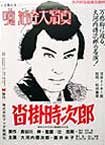 The story of Kutsukane Takijiro was filmed for Nikkatsu in 1929 by Tsuji Kichiro & is one of the few Japanese silent films to have survived. The story of Kutsukane Takijiro was filmed for Nikkatsu in 1929 by Tsuji Kichiro & is one of the few Japanese silent films to have survived.
Denjiro Okochi, one of Japan's first big superstars, played Takijiro as a nihilistic hero, his key swordfight dramatically shot with lots of camera movement advanced for its day.
A small still from this film is shown with the paragraphimmediately above, & a small image of an old poster with the present paragraph. Teinosuke Kinugasa filmed another version in 1934, but so far as I know it has not survived.
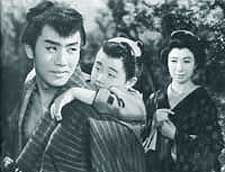 Kazuo Ikehira filmed Kutsukane Takijiro aka Gambler's Code for Daiei in 1961 with Raizo Ichikawa as Takijiro, co-starring Michiyo Kaoru as the ill widow. The DVD box at the top of this page is for the Ikehira version. Kazuo Ikehira filmed Kutsukane Takijiro aka Gambler's Code for Daiei in 1961 with Raizo Ichikawa as Takijiro, co-starring Michiyo Kaoru as the ill widow. The DVD box at the top of this page is for the Ikehira version.
The specific "code" addressed by this dramedy is that which requires a killing for a killing. The moral growth of Tokijiro demands that he learn the hard way that no one benefits under this code.
The attitude of this traditional story would be transmitted to the later yakuza-eiga genre when actors like Koji Tsuruta or Ken Takakura as 20th Century chivalrous gamblers who exist perpetually in a melancholy state.
copyright © by Paghat the Ratgirl
|
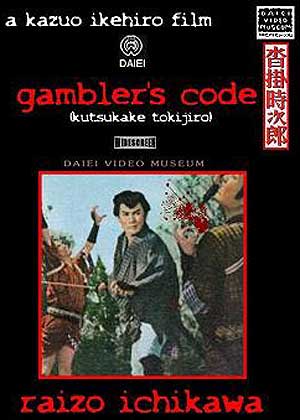

 Wandering gamblers were frequently regarded as outcasts not welcome in highway inns, but are welcomed into gambler-boss's residences along the way. This incurs a debt of "a night of obligation" in exchange for "a night's lodging." In many films of this sort becomes the basis for the tragedy that follows, when an unpleasant gangster boss accepts a wanderer into the household then requires him, for his incurred debt, to go kill somebody.
Wandering gamblers were frequently regarded as outcasts not welcome in highway inns, but are welcomed into gambler-boss's residences along the way. This incurs a debt of "a night of obligation" in exchange for "a night's lodging." In many films of this sort becomes the basis for the tragedy that follows, when an unpleasant gangster boss accepts a wanderer into the household then requires him, for his incurred debt, to go kill somebody.
 The story of Kutsukane Takijiro was filmed for Nikkatsu in 1929 by Tsuji Kichiro & is one of the few Japanese silent films to have survived.
The story of Kutsukane Takijiro was filmed for Nikkatsu in 1929 by Tsuji Kichiro & is one of the few Japanese silent films to have survived.